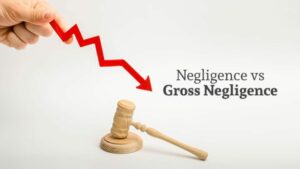The California Medical Board has revoked the surgical license of Hanford, California, veteran doctor Dr. David Wayne Nelson because of a disturbing example of extreme negligence. The board’s ruling resulted from Dr. Nelson performing an illegal sterilization procedure on a female patient, age 31, in clear violation of informed consent guidelines. Dr. Nelson’s unwillingness to address the accusations, which resulted in the loss of his right to a hearing and the potential suspension of his license, gives this case an unsettling element.
For those impacted by such upsetting acts, Kirakosian Law—which specializes in situations involving personal injuries and egregious negligence—becomes an indispensable ally. Beyond only advocating for clients, Kirakosian Law provides essential emotional support during the difficult path to justice. This blog aims to explain what is gross negligence and how a lawyer can assist you if you or a loved one has suffered as a result.
What is Gross Negligence?
Gross negligence is a legal concept that refers to a level of negligence that goes beyond ordinary negligence. It involves a reckless or willful disregard for the safety and well-being of others. In the context of medical or surgical procedures, like the case of Hanford physician David Wayne Nelson, gross negligence might entail actions or decisions by a healthcare professional that are so extreme and careless that they constitute a substantial departure from the accepted medical standards of care.
To put it another way, gross negligence is the result of a serious and intentional failure to apply the degree of care and caution that a reasonable person or professional would in the same situation. In court cases involving medical malpractice and other situations where victims seek damages for suffering or injuries brought on by such egregious conduct, it is frequently a crucial element. Gross negligence can often have dire repercussions, including harm, suffering, and even death since it puts patients in the care of medical professionals like doctors at serious risk to their health.

Penalties for Gross Negligence
If someone is found to be at blame in a standard negligence case, they usually have to pay damages to the affected person, such as lost wages, medical expenses, or property damage. However, the party at fault may be required to pay more in circumstances of gross carelessness than in typical negligence cases.
Compensation Damages
Typical negligence cases occur when an accident results in property damage or personal injury. Should the wounded party choose to file a lawsuit, they often demand compensation from the individual or business that was responsible for the accident. The reason this money is called compensatory damages is that it is intended to make up for the losses or injuries the aggrieved party has sustained.

Punitive Damages
Someone who is extremely careless or reckless (grossly negligent) may additionally be required to pay punitive damages in addition to paying the affected party. Though uncommon, these are intended to function as a form of discipline. A court will impose them in order to ensure that the one receiving punishment won’t engage in the same reckless behavior in the future. It serves as a message that this kind of behavior is unacceptable.
Think about a situation where a surgeon makes a lot of big mistakes during an operation, and the patient gets seriously hurt or even dies. When they look into it, they find out that the surgeon was either using drugs or alcohol during the surgery or had a history of doing surgeries that turned out really bad. Did you know that there is even compensation for when someone goes through a traumatic brain injury (TBI) in the state of California?
In this case, what the surgeon did is considered really careless and reckless, and the court might decide to make them pay punitive damages. These damages are meant to teach not just this surgeon but all doctors and surgeons how important it is to be very careful and do their jobs properly. But, how can someone tell if what they went through is a case of negligence or gross negligence?
The Difference Between Negligence Vs. Gross Negligence
What is negligence? Negligence is when someone doesn’t act as carefully as a reasonable person would in a similar situation. For instance, if you’re driving a car and accidentally run a red light because you didn’t notice it, that’s negligence. You should have stopped at the red light, but you didn’t, and it resulted in a minor accident with another car. Negligence is about not doing what a careful person should do to prevent harm.
Now what is gross negligence? Gross negligence is even more serious. It’s when someone acts so carelessly that it seems like they’re intentionally ignoring others’ safety. It’s way beyond what a normal, careful person would do. Imagine you’re not just running a red light but also speeding excessively, texting on your phone, and ignoring all the traffic signals.
This extreme recklessness is an example of gross negligence. It’s much worse than regular negligence because it shows a total disregard for the safety of others and could lead to a severe accident with significant harm or even loss of life.

How Kirakosian Law Can Help You!
So what is gross negligence? As we’ve discussed today, gross negligence is a serious matter, especially in personal injury cases, with potentially significant consequences. If you ever find yourself harmed due to someone else’s recklessness, it’s crucial to seek guidance from legal experts who can navigate this complex terrain effectively.
Enter Kirakosian Law Group! Our team of seasoned professionals possesses an in-depth understanding of personal injury law, including the critical distinctions between ordinary and gross negligence. If you suspect that you’ve been a victim of gross negligence, don’t hesitate to get in touch with us. We are committed to defending your rights and ensuring that justice prevails, regardless of the scale of the incident.

